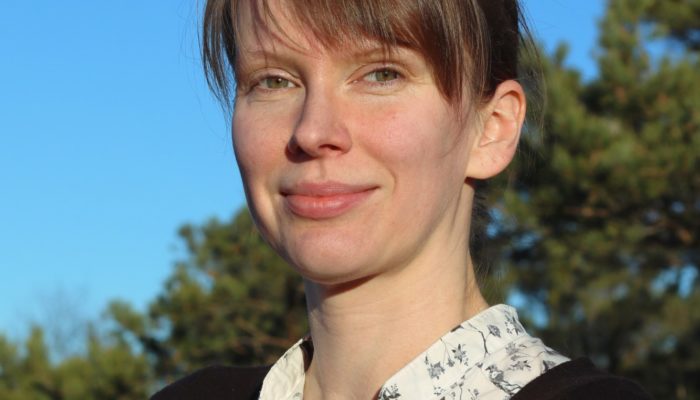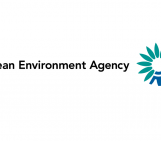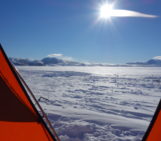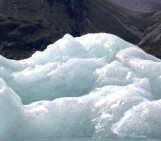
Hi Céline. Thank you for joining us today. Congratulations on winning the 2022 Ocean Sciences Division Outstanding Early Career Scientist Award! Could you tell our readers a bit about yourself and your research?
As of just a few months ago, I am tenured! My exact job title is “Senior Lecturer in climatology” at the University of Gothenburg, in southwest Sweden. Originally I am from France, and I am actually an engineer in boat and off-shore platform design. I moved to the UK 10 years ago to do a PhD in physical oceanography at the University of East Anglia, where I studied the deep waters that form around Antarctica in climate models, and at the end of it, I moved to Sweden, to the deep waters of the North Atlantic, and to observations. I am now looking at deep waters globally, although my current favourite region is the Arctic.
The deep ocean evokes an enigmatic and unreachable environment for many of us land dwellers, however your research identifies these abyssal waters as hosts for systems critical for environmental health at a global scale. Can you tell us more about why us terrestrials should take notice of what happens in the deep?
Funny, we had a long conversation along these lines at EGU with the artist in residence Jakub Stepanovic. Humans are absolutely fascinated about space: it’s dark, it’s mostly empty, we can’t survive there without specific equipment, and we keep imagining that is populated by squid-like and/or bioluminescent creatures. Yet we ignore the deep ocean, which fits this exact description! It even features dragons! I really do not understand this general indifference.
Beyond the sci-fi-material potential, the deep ocean plays a crucial role in the entire climate system. The formation of deep waters is what sets the global oceanic circulation in motion. This formation mechanism also sends our human-caused extra heat and carbon to the deep ocean, where it can be stored for a while; that is, the deep ocean is a strong climate-crisis-mitigator. Meanwhile, the bottom of the ocean is where most nutrients are located; a large part of the ocean ecosystem depends on these deep waters going back up to get their food.
And finally, there’s the deep sea ecosystem itself. Creatures there had to adapt to living in the cold, dark, and under extreme pressure. Even more extreme are those that live by underwater volcanoes. They completely rewrote our definitions of “life” and where life can thrive. Some of these creatures even regenerate themselves or seem to never die! Sure, it is personal to me because most of my relatives have died of cancer, but when I hear on the one hand medical researchers who suspect that these deep creatures must hold the cure to cancer, and on the other hand the mining industry who wants to destroy their habitat, I know who I am rooting for.
Many of us share a passion for marine health, from reducing plastic pollution to advocating for sustainable fishing practices, but don’t have the insight of experts like yourself. How can non-experts engage their passion for a healthier ocean?
I would recommend that non-experts educate themselves, but be aware that there is no turning back and may lead you to feeling overwhelmed and powerless. I have cried crocodile tears in the supermarket because I could not find any fish that had not been trawled (ok, I was a bit tired on that day as well). I even stopped eating my favourite food, which since I grew up by the coast was a type of seafood, just because I could no longer stand the dissonance. That is, I could no longer enjoy the taste without half of my brain screaming “Murderer! This is so unsustainable! Shame!”
Anyway, education, and consequent behaviour change. Check e.g. the WWF annual “red list” for seafood that details which species are most at risk before you go food shopping, and make sure to buy only the green (not at risk) ones. Don’t buy into the clickbait-y tech articles that promise “this robot will clean the open seas!”, and rather read the analyses by experts such as Rebecca Helm for the impact on the ecosystem, or Helen Scales for the deep ocean, or Ben Franta for more information and accountability for the polluters. And then decide who to stop buying from (I won’t name and shame here), or which local project to support.
Ultimately though, individual behaviour change can only go so far if the politicians don’t listen. My own country of origin still is one of the most aggressive lobbyists for harmful fishing subsidies, even though there is no consumer demand for the targeted species and they end up as cat food. Plastic pollution won’t be reduced as long as the petroleum industry, which includes “Big Plastic”, keeps such a tight hold on our policies and economies. I find solace in following large campaigning organisations online. I do not know who they are managed by; I do not even know how I could contribute as a scientist; but as a citizen, I share (retweet) their successes, not least because it makes me happy. I talk about their work to anyone who will listen, and sign the petitions that matter. For everything regarding the opposition to deep sea mining for example, I can recommend Deep Sea Conservation Coalition (@DeepSeaConserve).
You are also an active science communicator, from authoring articles for the EGU to contributing to debate on the precarity of academic contracts just this past General Assembly. How important do you think it is for Early Career Scientists like yourself to engage with such activities beyond core research projects?
I have mixed feelings about science communication. Personally, I did it because I enjoy writing, and the EGU Cryoblog crew was real fun to work with. I also feel strongly that indeed, we should share our tax-payer-funded results with the general public.
On the other hand, I am tired of how much work we are expected to do for free; of how the more you do, the more you are expected to do; and of how those who don’t do any don’t suffer any consequence. Take outreach for example, or even teaching, shockingly: for every recruitment I’ve witnessed so far, publication, citations, and funding were the primary criterion. Everything else, and especially outreach, is a bonus to distinguish candidates that were ranked similarly. Same for our yearly salary negotiations.
I do have the advantage that now, I am on the other side. My position is somewhat safe. I mean, I’ve never had issues telling others when they were wrong, even though that did not always go very well, but now I can really point out unsustainable practices without fearing life-impacting consequences. And I am quite privileged to be in that position, so it would be wrong of me to not engage in activities to improve academia (e.g. discussing the exploitive nature of the current postdoc model, shortcomings of peer-review and the rip-off that for-profit publishing is, or even calling out unacceptable behaviour). Besides I now review grant applications and I am involved in recruitments, so I personally can give importance to “merits” beyond h-index and impact factors.
Finally, what’s next on the horizon for you?
Before the end of the year, the analysis of my sensors that sat at more than 4000 m depth, at the bottom of the Arctic Ocean, for more than a year. And hopefully, an expedition to the Arctic in 2024 -pandemic, war, and whatever-comes-next dependent.



